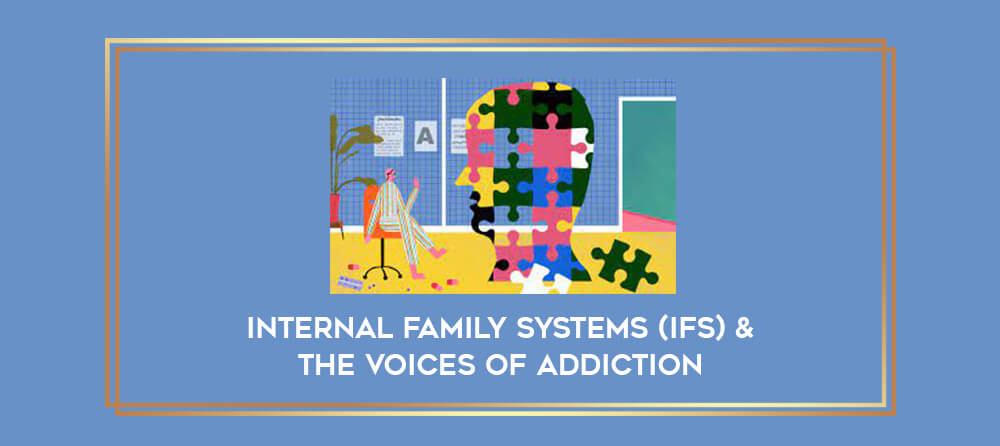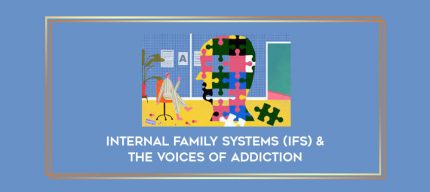Internal Family Systems (IFS) & The Voices of Addiction
Course Description
Archive : Internal Family Systems (IFS) & The Voices of Addiction Digital Download
Salepage : Internal Family Systems (IFS) & The Voices of Addiction
Delivery : Online With Any Device
Faculty:
Cece Sykes, LCSW, ACSW | Mary Kruger, MS, LMFT | Richard Schwartz, PhD
Duration:
15 Hours 24 Minutes
Copyright:
Jan 01, 2018
Product Code:
IRS035003
Media Type:
Online Course
Outline
Redefining -Addiction – How will IFS Help?
To begin we present a framework for understanding not just substance addiction, but disordered eating, self-harm, and many other impulsive and compulsive behaviors. We call this Addictive Process. This framework highlights the similarities among many common presenting problems and allows you to confidently approach treatment with these kinds of entrenched inner dynamics.
Introducing Mary & Cece
Defining the Addictive Process
6 Key advantages of IFS for dealing compassionately and effectively with addictive process, including how IFS can prevent relapse
Demos of two hypothetical first sessions, showing how to quickly gain the trust of highly polarized, addictive systems and begin treatment on the right foot
Treating a System not a Symptom
We discuss the common pattern of firefighters, managers, and exiles that accompanies the many varieties of addictive process, and how best to enter into this delicate balance to create positive change.
Parts and Roles in Addictive Process
Identifying the Inner System
Importance of Tracking the Process
Self-Spectrum: Building a Self to Parts relationship
Befriending Addictive Parts
We get into the nitty-gritty of working with the dangerous distractor parts that are responsible for addictive behaviors. We discuss the common responses of therapists’ parts to these firefighters, the pitfalls they can drag us into, and how to expertly avoid those pitfalls to befriend and heal these often exhausted protectors.
Common Pitfalls with Extreme Protectors
Identifying Addictive Manager-Firefighter polarizations
Working with Entrenched Systems
Therapists’ Parts and the Addictive System
IFS and Addiction in Action
This module applies the ideas presented in the previous three months to working with even the most challenging addictive systems. We delve into the process of building compassion for all sides of the protective system in addictive process, as well as for the exiles underneath. We wrap up with two demos showing how to apply what we’ve taught in session.
How to work with clients you feel like you can’t do IFS with
How not to collude with Managers
Demonstration of IFS Assessment
Demo of working with Polarizations and Disregulation
** CEU Credits are not available for this program **
Learning Objectives
- Compare various traditional definitions of addiction and establish an IFS conceptualization of the addictive process that encompasses their core ideas.
- Describe the 3rd Order Change and evaluate the ways in which expanding the range of factors considered in IFS treatment can improve the overall understanding of the addictive process.
- Determine the differences between traditional treatments for addiction and psychotherapy-based treatments, and consider the ways in which IFS can synthesize each approach.
- Demonstrate clinical applications of IFS in order to evaluate various problems that may arise, and facilitate discussion about potential solutions.
- Establish essential basic assumptions in the IFS framework and discuss the implications for a paradigm shift in addiction treatments.
- Explain the 3 general categories of parts in the IFS model, including Managers, Firefighters, and Exiles, and evaluate their primary roles in perpetuating a cycle of polarization.
- Organize the various parts of the process so as to demonstrate the extent to which polarization fosters addiction, and explore methods of identifying the system.
- Discuss the self-part relationship and consider the value of the therapist engaging in separation from personal biases in order to provide an objective and welcoming atmosphere for the client.
- Assess common setbacks in IFS treatment and outline the ways in which a self-part relationship can reduce resistance among clients.
- Identify common manager-firefighter polarizations and compare the problems that they pose in order to foster preparedness and experience in treating the addictive process.
- Investigate extreme cases of entrenched systems and discuss methods for working with clients who are unable to separate from their parts in order to demonstrate the flexibility of IFS treatment.
- Support the value of the therapist’s separation of parts though communicating the various ways in which a good presence of self creates trust and acceptance in the client.
- Describe how to interview Managers and Firefighters from the self in order to support clients’ ability to befriend their parts and gain a better understanding of the addictive process.
- Assess how to lend the self to a blended system in order to begin the process of separation for clients with high resistance.
- Demonstrate the ways in which the separation of parts can reveal Exiles, and discuss the importance of unburdening Exiles to complete the healing process and prevent future relapse.
- Summarize the key concepts of IFS addiction treatment and consider additional concerns and resources for improving the model.























Reviews
There are no reviews yet.